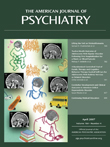Adverse Subjective Experience With Antipsychotics and Its Relationship to Striatal and Extrastriatal D 2 Receptors: a PET Study in Schizophrenia
Abstract
OBJECTIVES: Antipsychotic medications improve psychosis but often induce a state of dysphoria in patients. Blockade of the dopamine D 2 receptors, which is thought to mediate their efficacy, has also been implicated in producing this adverse subjective experience. The authors present the first double-blind controlled study to examine the relationship between striatal and extrastriatal dopamine D 2 receptor binding potential and occupancy values and adverse subjective experience. Method: Patients with recent-onset psychosis (N=12) were randomly assigned to low or high doses of olanzapine or risperidone. Subjective experiences, motor side effects, and striatal and extrastriatal dopamine D 2 receptors (determined with ([ 11 C]raclopride and [ 11 C]FLB 457 PET scans, respectively) were evaluated after 2 weeks of continuous antipsychotic treatment. Results: Higher dopamine D 2 receptor occupancy and binding potentials in the striatal (dorsal and ventral), temporal, and insular regions were associated with subjective experience. The finding was confirmed with two convergent methods of analysis (region-of-interest and voxel-based statistics), and the same relationship was observed using two different dopamine receptor measures (observed binding potential values and age- and sex-corrected occupancy values). Conclusions: Higher D 2 receptor occupancy is associated with negative subjective experience in patients taking risperidone or olanzapine. These negative subjective effects may be related to the high discontinuation rates seen in usual practice. Understanding the neurobiological mechanism of these negative subjective experiences and developing antipsychotics with novel (i.e., non D 2 ) mechanisms may be critical in improving the treatment of psychosis.



